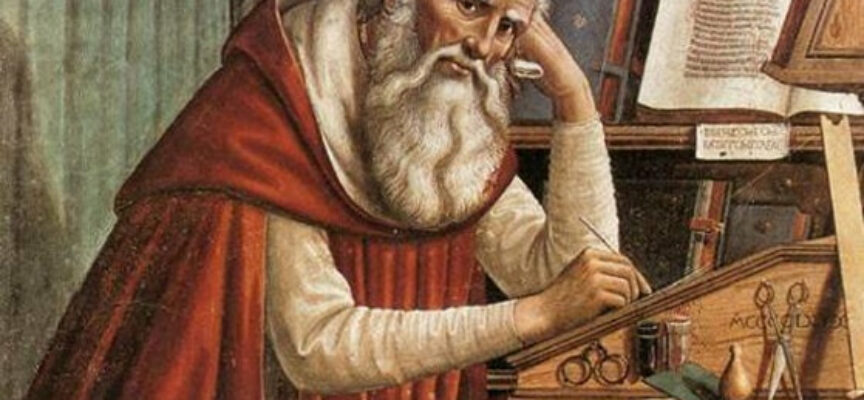The early church forged its thinking about politics from Scripture and in the context of a decadent pagan Roman Empire. It grappled with how best to further the Christian mission in such a context. Should it withdraw from the political sphere, given its persecuted minority status within the empire? Conversely, should it expend the majority of its energies to political activism? Or, is it best to make a third way between these two extreme ends of the “religion and politics” spectrum?
As the early church grappled with this tangle of questions, it began to form some conclusions. Those conclusions found their fruition in the writings of Augustine of Hippo, especially from his book, City of God. Thus, given the fact that Bible-believing Americans inhabit a minority position in our own increasingly pagan nation, it is helpful for us to reflect on Augustin’s conclusions.
Augustine’s writings are the last flowering of the ancient period and the first blossoming of the medieval era. During this transitional era, Augustine wrote often about politics and public life. Early on, he embraced a Platonic view in which society was hierarchically ordered and in which individuals could attain “the good” through their own moral striving. Eventually, and especially in the wake of the Pelagian controversy, he rejected this view and revised his view of politics. No longer was social order meant to embody an overarching cosmic order, thus leading the good citizen on an ascent to the good life. Instead, it was meant, more minimally, to minimize disruptive forces and keep society from disintegrating. His mature political theology stressed the havoc that sin and idolatry wreaks on the individual and on society. Fallen individuals are possessed of inordinate love—they worship created goods rather than the God who created those goods. Moreover, the individual idolatries of a society coalesce at the political level to corrupt and misdirect the political realm.
Indeed, the backdrop for Augustine’s most significant treatment of politics—City of God—is not only the sacking of Rome but also Augustine’s emphasis on depravity and corresponding rejection of the Pelagian view. In the aftermath of Rome’s sacking, certain pagan intellectuals blamed Rome’s fall on its adoption of Christianity and its subsequent rejection of the Roman religion, politics, and philosophy. In City of God, Augustine responded to the religious objection by arguing that the Roman gods were immoral and even laughable; not even the famous historian of religion, Marcus Varro, believed in their divinity. He responded to the political objection by showing that Rome’s boasting about its political justice was a mask for its real love which was raw power and domination. Third, he responded to the philosophical objection by arguing that Rome’s philosophers, brilliant as they were, were inhibited by their pride from believing in Christ’s incarnation and resurrection, and thus were incapable of understanding the deepest truths of the world. Thus, if Roman society wished to be healthy politically, it should more fully embrace Christ and more fully reject the pagan founding narrative along with its gods and philosophies. In embracing Christ rather than idols, a person becomes a member of the eternal city of God rather than the city of man, and thus engages in the political realm with his affection set on God rather than on idols.
In Books 2 and 19 of City of God, Augustine addresses politics in a concentrated manner. In Book 2, he begins with a discussion of Cicero’s claim that Rome was not a true republic because it has ceased to be just. Then he contrasts Christ, founder of the city of God, with Cicero’s ideal earthly statesman. Whereas Cicero’s statesman promotes justice through eloquent rhetoric and exemplary conduct, Christ is more than merely a better orator and truer exemplar. He is not even an example for us in the sense that he never had to repent or depend on God’s grace. Instead, he is the active agent of our transformation, the one who forgives us and transforms our lives. For this reason, we must cultivate faith and humility if we wish to live justly in the political realm. In Book 19, he emphasizes humility especially. A truly good political leader, he argues, is one who views himself as a repentant sinner and who prefers to see God praised instead of himself. Similarly, a truly good citizen is one who refuses to flatter his political leaders or treat them as gods. Thus, both political leaders and citizens should lean heavily on God’s grace if they wish to cultivate true political virtue and true patriotism.
All political theology after Augustine must wrestle with his paradigmatic contribution. Indeed, the post-Constantinian Roman Catholic church found support for its political theology in several elements of Augustine’s thought, but also in exclusion of others. After the schism in 1054, global Christianity divided into denominational traditions. Although these traditions do not each have a clearly outlined political theology, they each have discernible impulses and tendencies, and in some way owe a debt to Augustine’s political writings. This article will summarize briefly six of those traditions—Roman Catholic, Eastern Orthodox, Lutheran, Reformed, Anabaptist, and Black Church. It summarizes them in order of their historical development. It should be noted that the traditions represented in this article are rich and diverse. This article, therefore, cannot possibly account for the tradition in detail or delineate the tradition’s political theologians individually. Instead, it can only summarize some of the most prominent aspects of that tradition.
The most important aspect of each tradition, as it relates to political theology, is its construal of the relationship between creation, fall, and redemption, or between “nature” and “grace.” By nature, we mean the created world humans live in, along with the various spheres of culture that find their home in the created realm. By grace, we mean God’s gracious redemption. Thus, in political theology, the central issue is the relationship of our Christianity (grace) to the political realm (nature).
In the next post, we will discuss Catholic and Orthodox views of the proper relationship of Christianity and politics.
Subscribe
Never miss a post! Have all new posts delivered straight to your inbox.







